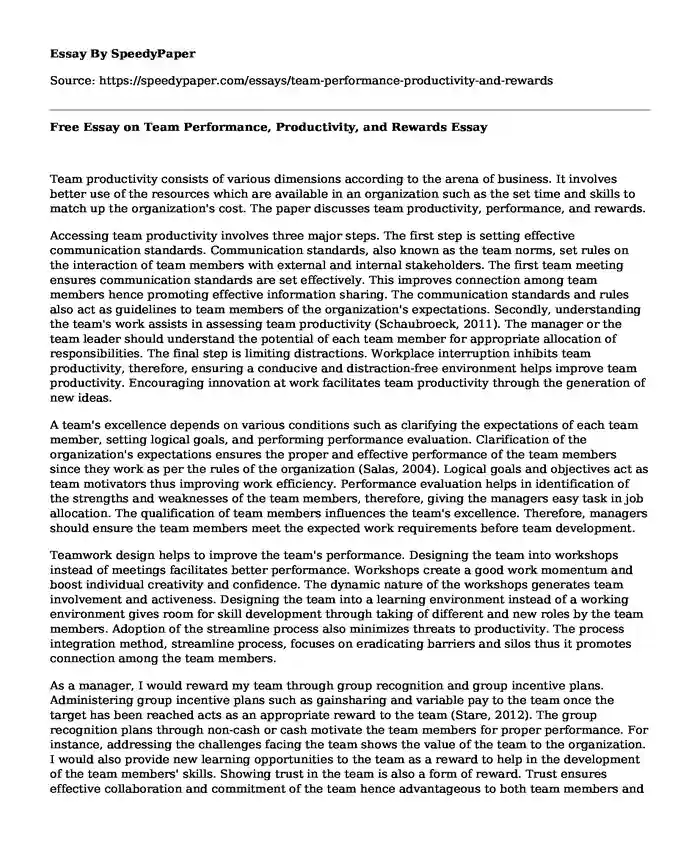
| Type of paper: | Course work |
| Categories: | Organizational behavior Organizational culture |
| Pages: | 3 |
| Wordcount: | 639 words |
Team productivity consists of various dimensions according to the arena of business. It involves better use of the resources which are available in an organization such as the set time and skills to match up the organization's cost. The paper discusses team productivity, performance, and rewards.
Accessing team productivity involves three major steps. The first step is setting effective communication standards. Communication standards, also known as the team norms, set rules on the interaction of team members with external and internal stakeholders. The first team meeting ensures communication standards are set effectively. This improves connection among team members hence promoting effective information sharing. The communication standards and rules also act as guidelines to team members of the organization's expectations. Secondly, understanding the team's work assists in assessing team productivity (Schaubroeck, 2011). The manager or the team leader should understand the potential of each team member for appropriate allocation of responsibilities. The final step is limiting distractions. Workplace interruption inhibits team productivity, therefore, ensuring a conducive and distraction-free environment helps improve team productivity. Encouraging innovation at work facilitates team productivity through the generation of new ideas.
A team's excellence depends on various conditions such as clarifying the expectations of each team member, setting logical goals, and performing performance evaluation. Clarification of the organization's expectations ensures the proper and effective performance of the team members since they work as per the rules of the organization (Salas, 2004). Logical goals and objectives act as team motivators thus improving work efficiency. Performance evaluation helps in identification of the strengths and weaknesses of the team members, therefore, giving the managers easy task in job allocation. The qualification of team members influences the team's excellence. Therefore, managers should ensure the team members meet the expected work requirements before team development.
Teamwork design helps to improve the team's performance. Designing the team into workshops instead of meetings facilitates better performance. Workshops create a good work momentum and boost individual creativity and confidence. The dynamic nature of the workshops generates team involvement and activeness. Designing the team into a learning environment instead of a working environment gives room for skill development through taking of different and new roles by the team members. Adoption of the streamline process also minimizes threats to productivity. The process integration method, streamline process, focuses on eradicating barriers and silos thus it promotes connection among the team members.
As a manager, I would reward my team through group recognition and group incentive plans. Administering group incentive plans such as gainsharing and variable pay to the team once the target has been reached acts as an appropriate reward to the team (Stare, 2012). The group recognition plans through non-cash or cash motivate the team members for proper performance. For instance, addressing the challenges facing the team shows the value of the team to the organization. I would also provide new learning opportunities to the team as a reward to help in the development of the team members' skills. Showing trust in the team is also a form of reward. Trust ensures effective collaboration and commitment of the team hence advantageous to both team members and the manager.
In conclusion, team excellence depends on the collaboration of the team members. A manager has to ensure team inclusion to ensure the success of the organization. Team rewarding motivates the team members thus it facilitates team commitment and performance. Proper management of a team ensures the success of a firm.
References
Salas, E. E., & Fiore, S. M. (2004). Team cognition: Understanding the factors that drive process and performance. American Psychological Association.
Schaubroeck, J., Lam, S. S., & Peng, A. C. (2011). Cognition-based and affect-based trust as mediators of leader behavior influences on team performance. Journal of Applied Psychology, 96(4), 863.
Stare, A. (2012). The impact of a project organizational culture and team rewarding on project performance. Journal for East European Management Studies, 40-67.
Cite this page
Free Essay on Team Performance, Productivity, and Rewards. (2022, Jul 27). Retrieved from https://speedypaper.com/essays/team-performance-productivity-and-rewards
Request Removal
If you are the original author of this essay and no longer wish to have it published on the SpeedyPaper website, please click below to request its removal:
- Anxiety Essay Example
- Free Essay Example: Five Product Elements for Nilodor
- Essay Sample: Technology and Economic Performance
- Slinical infectious diseases
- Research Assessment Statement on Food Safety Regulation, Essay Example
- Nursing Essay Sample: Characteristics of Research Utilization and Evidence-Based Practice
- Free Essay Analyzing the Articles on Ethnonationalism
Popular categories




